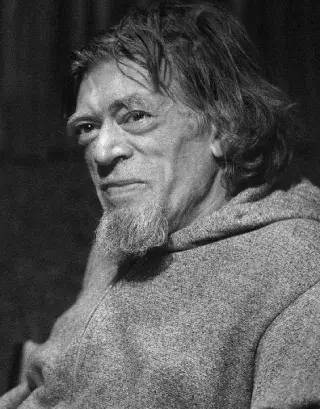Biography of Milton Acorn

| date | place | |
|---|---|---|
| born | March 30, 1923 | Charlottetown, Canada |
| died | August 20, 1986 | Charlottetown, Canada |
Milton James Rhode Acorn, born in Charlottetown, Prince Edward Island, emerged as a pivotal figure in Canadian literature, known for his impassioned writing style and staunch advocacy for the working class. His upbringing in a working-class family profoundly shaped his worldview and, subsequently, his poetry and plays, embedding a strong sense of social justice and political activism in his work. Acorn's experiences during World War II, where he served in the Canadian Army, left a lasting impact on him, both physically and psychologically, contributing to themes of struggle, resilience, and empathy in his later works. These themes resonated with many, making his poetry both a reflection of personal experience and a broader commentary on society. He moved to Montreal in the 1950s, where he became deeply involved in the city's vibrant literary scene. This period was crucial for Acorn, as he honed his poetic voice and solidified his commitment to writing as a form of political and social engagement. His work from this period began to attract attention for its raw energy, emotional depth, and unapologetic engagement with issues of poverty, injustice, and human rights. Acorn's contributions to Canadian literature include a rich body of poetry that is celebrated for its authenticity and powerful lyricism. His notable collections, such as "The Island Means Minago" (1975), delve into the complexities of Canadian identity, land, and the struggles of the working class, themes that remained central to his work throughout his life. This collection, in particular, is often cited as a masterpiece for its epic portrayal of the exploitation of natural and human resources on Prince Edward Island. In 1970, Milton Acorn was awarded the Canadian Poets Award, which he famously referred to as the "People's Poet Award," reflecting his self-identification with the common man and his disdain for the commercialization of poetry. This title became a moniker that followed him throughout his career, symbolizing his commitment to writing poetry that was accessible and relevant to the everyday lives of Canadians. Despite facing numerous challenges, including health issues and financial instability, Acorn's influence on Canadian literature remained significant. He was not only a poet but also a mentor and inspiration to younger generations of writers, encouraging them to explore and articulate their own experiences and views on Canadian society. Milton Acorn passed away on August 20, 1986, in Charlottetown, leaving behind a legacy that continues to influence Canadian literature. His work is remembered for its profound empathy, vigorous advocacy for social justice, and deep love for Canada and its people. Acorn's life and writing embody the spirit of resistance and the power of poetry to effect social change, making him a seminal figure in the canon of Canadian literature. Milton Acorn's poems stand as a monumental contribution to Canadian literature, capturing the essence of the nation's landscape, the spirit of its people, and the struggles of the working class with profound empathy and raw emotional power. Known as "The People's Poet," Acorn's work resonates with readers searching for authenticity and passion in poetry. Through his collections, such as "The Island Means Minago" and "In Love and Anger," Milton Acorn crafts a poetic narrative that is deeply rooted in Canadian identity, making Milton Acorn Poems a must-search for enthusiasts of powerful, socially engaged literature. His unique voice and unflinching commitment to exploring themes of justice, love, and resistance not only earned him the Canadian Poets Award but also solidified his place as an indispensable figure in the realm of Canadian poetry. For those looking to explore the depth of Canada's poetic heritage, Milton Acorn Poems offers a treasure trove of insight, emotion, and literary prowess.
Feel free to be first to leave comment.